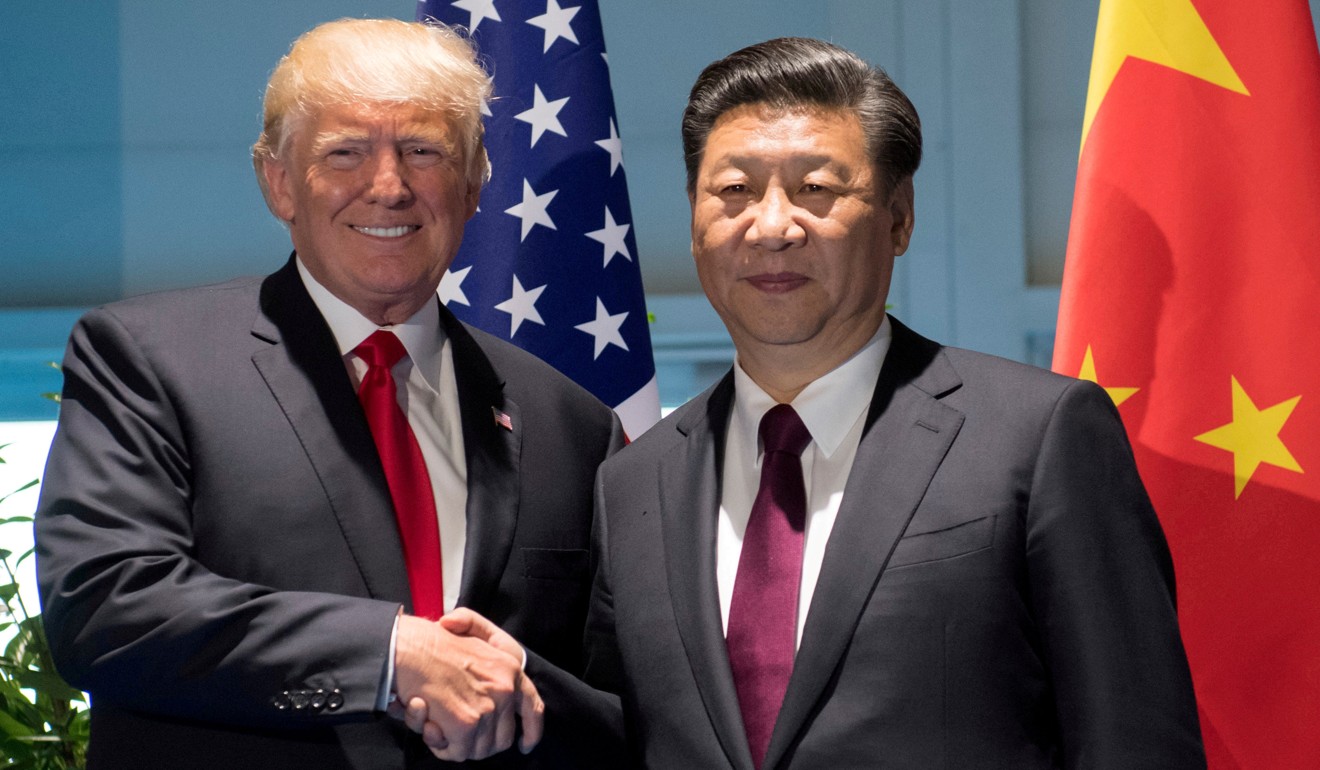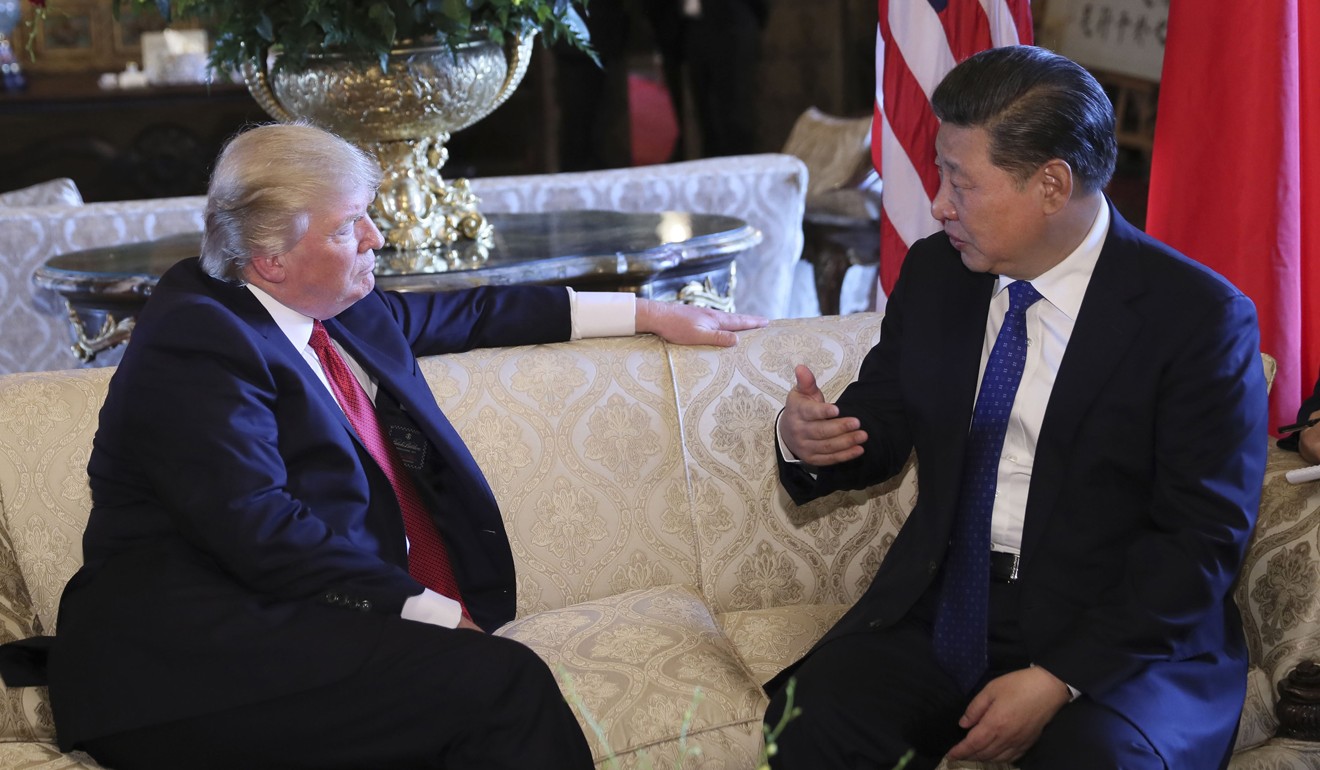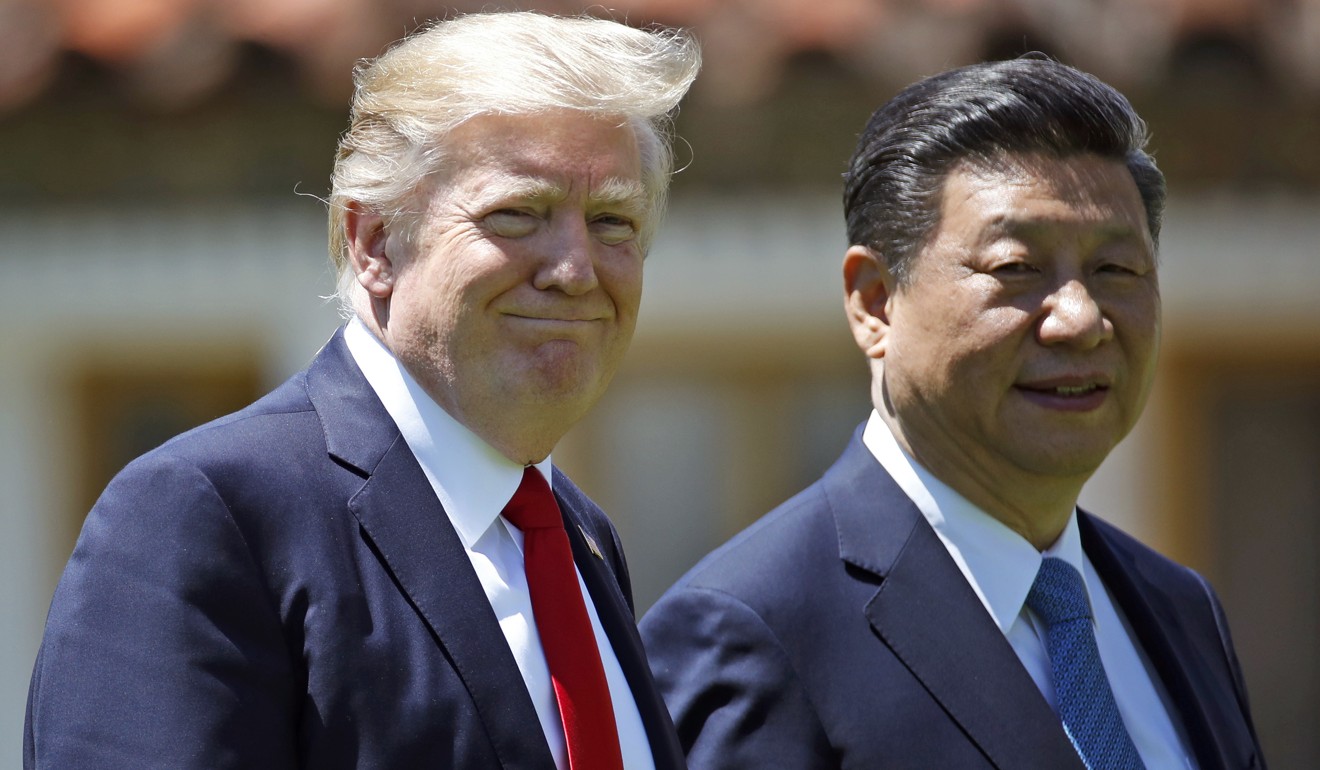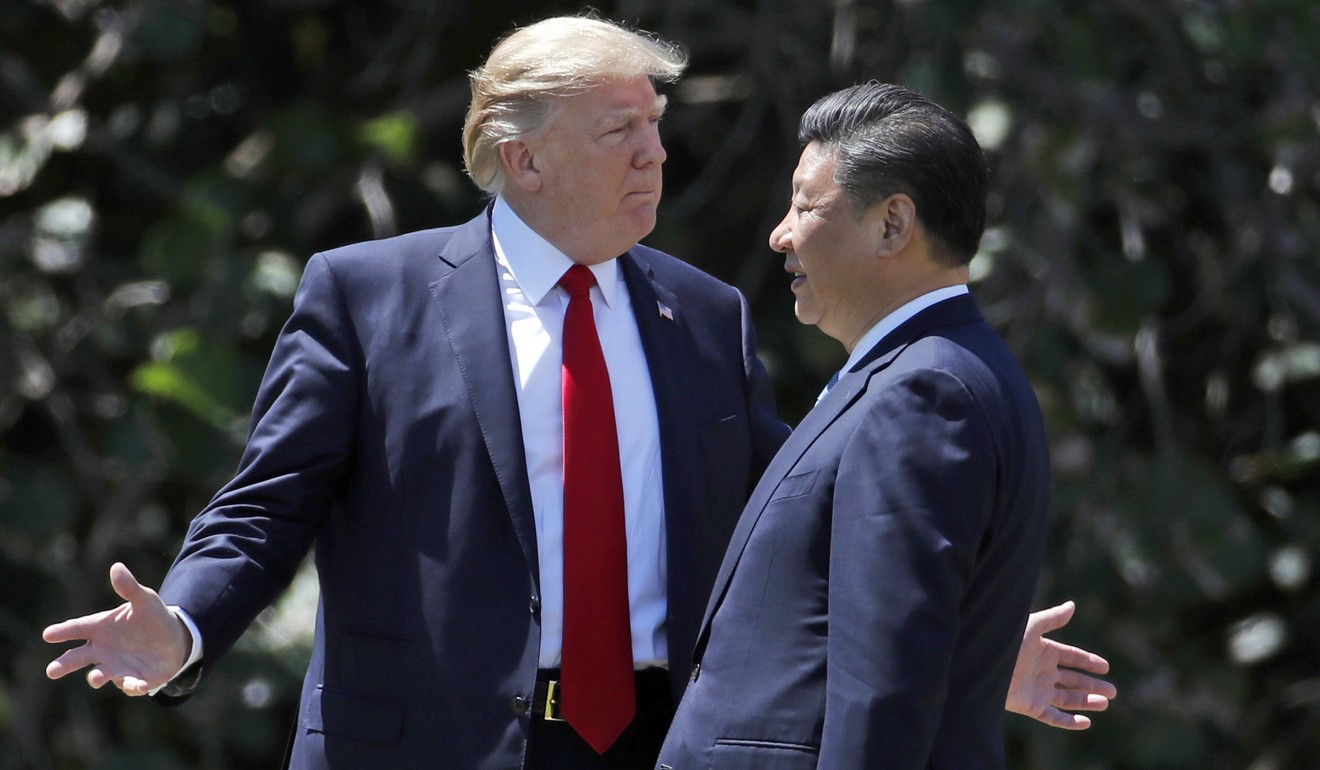
With Donald Trump weaker and Xi Jinping stronger, what will happen when US and Chinese leaders meet in Beijing?
Chinese President Xi Jinping will receive Donald Trump as the country’s strongest leader since Deng Xiaoping or even Mao Zedong
US President Donald Trump’s arrival in Beijing on Wednesday at the start of his maiden China trip marks the first test of President Xi Jinping’s consolidated power following his proclamation of a “new era” for his country and the Communist Party last month.
Despite intense behind-the-scenes negotiations and wrangling in the lead-up to Trump’s high-stakes visit, which will last less than 48 hours but has widely been viewed as the fulcrum of his two-week Asia tour, both leaders will be keen to guarantee their third sit-down summit is a trouble-free one.
Xi has just completed a major power reshuffle that elevated his position and made his control over the party and China stronger than ever. He now has his men in all key positions and will receive Trump on his home turf as the strongest Chinese leader since Deng Xiaoping or even Mao Zedong.
Trump, meanwhile, is bogged down in a domestic political quagmire, facing accusations and challenges from all sides, and is a weaker figure than at the two leaders’ first summit meeting in Florida in April. His team is also divided and lacks leadership, with Secretary of State Rex Tillerson marginalised, and his foreign policy lacking clarity and focus.
But given the United States is still the stronger partner in the relationship, China will have to host him with the utmost care, hoping all the trappings will satisfy his ego and make for a more fruitful dialogue.
According to diplomats and observers, the two alpha males, representing the dominant world power and a rising challenger under its most powerful leader in recent decades, will be all smiles in front of the cameras despite their looming rivalry for global leadership.
For China observers, unprecedented reciprocal visits by the Chinese and US leaders in the first year of a US presidency speak volumes about the ever-growing interdependence of the world’s top two economies amid tensions and structural competition.
However, they caution, the first Beijing trip by the embattled Trump, who has been weakened due to domestic political chaos, is unlikely to see breakthroughs on the major flashpoints in bilateral relations.

“Trump’s visit to China will be strong on form but weak on content … [because] most of the thorny issues in US-China relations, including trade, North Korea and the South China Sea are essentially irresolvable,” said Gal Luft, co-director of the Institute for the Analysis of Global Security, a Washington-based think tank.
“At best, they can be managed. Each side wants the other to take steps that it is not willing to take. That said, the visit will still be positive because both sides will not want to poison the atmosphere.”
Pang Zhongying, a Beijing-based international affairs expert, said Trump’s visit, coming so soon after Xi’s consolidation of power, offered an opportunity for both countries to redefine bilateral ties for the coming decades.
“The visit coincides with Beijing’s major overhaul of its relations with major countries, which appears to be under way after the 19th party congress,” he said, referring to China’s recent moves to reduce tensions and repair ties with neighbours including South Korea and Japan.
“I think top Chinese leaders will want to seize the opportunity to take stock of bilateral ties which were established nearly 40 year ago, adjust the country’s foreign policy and figure out a better way to deal with the Trump administration.”
Ma Zhengang, a former Chinese ambassador to Britain, said summit diplomacy played a key role in Beijing’s handling of its all-important relations with Washington, with frequent exchanges and meetings between the US and Chinese leaders and top diplomats over the past year.
But Luft said the bromance between Trump and Xi would be put to test when both headed to Vietnam for the annual Asia-Pacific Economic Cooperation summit this weekend.
Leaders from some 20 regional nations are expected to voice concerns over how to deal with China’s increasing assertiveness under Xi and the absence of a coherent and comprehensive Asia strategy in Washington under Trump.
“But after the visit expect the daggers to come out,” Luft said. “For example, November 13 is the deadline for Trump to make a determination on punitive measures against Chinese solar panels. A salvo of tariffs on solar modules as well as aluminium foil is likely to be announced.”
Professor Shi Yinhong, a Renmin University international relations specialist, said that although Trump was likely to further press Xi to rein in Pyongyang’s nuclear ambitions, Xi was unlikely to “make as much compromise as he did at the Mar-a-Lago summit” in Florida in April.

“Xi Jinping is enjoying high status now and this will give him immense support on foreign policy, but it’s hard for him to get any tougher on North Korea,” Shi said. Instead, Beijing was more likely to make concessions on trade, such as opening up market access and allowing more American goods to be imported into China.
Dean Cheng, a senior research fellow at the Washington-based Heritage Foundation, said Trump would confront “an interesting new leadership structure” in China, which would place much greater importance on foreign policy issues following the elevation of the country’s top-ranking diplomat, State Councillor Yang Jiechi, to the party’s Politburo, its top echelon of power.
“This is the first time since 1999 we have seen somebody with that foreign policy portfolio explicitly assigned to him elevated to the Politburo,” he said, adding that Xi’s top policy adviser Wang Huning, who also had an international relations background, had been promoted to the Politburo Standing Committee, the party’s innermost circle of power.
Alexander Vuving, a China expert at the Daniel K. Inouye Asia-Pacific Centre for Security Studies in Honolulu, said that while Trump’s visit might give him a vivid experience that could change his views in the future, it also gave Xi a great opportunity to persuade the American president on issues such as trade and North Korea.
“But here Chinese leaders are faced with a dilemma,” he said. “The more China appears to be more powerful, the more Trump will expect of China’s role in international issues. So frustration is bound to occur.”
Yun Sun, a fellow with the East Asia programme at the Stimson Centre in Washington, said China’s ambassador to the US, Cui Tiankai, was on the right track in promising to give Trump a “state visit-plus”, featuring a military honour guard, a formal banquet, and some “special arrangements”.
“Treat Trump royally and with all the respect he desires, and some deals to sweeten the pot and make his visit productive,” she said.
Most diplomats and analysts predict that under an emboldened Xi, who had his name enshrined in the party constitution at the party congress, China would double down on its assertiveness in the Asia-Pacific region in a bid to expand its influence and counter US dominance in the region.
But they say that a more assertive China – exploiting the current weaknesses in the major Western powers – also faced an increasing risk of conflicts with Washington and Beijing’s Asian neighbours.
“From the overall bureaucracy to the foreign policy establishment in China, there are lots and lots of people who think that China has now grown out of the baby size of Deng Xiaoping’s foreign policy and China now needs to articulate its interest with a much louder voice,” said Alexander Gabuev, a senior fellow at the Carnegie Moscow Centre.
Gabuev said that assertiveness was closely linked to changes in China’s external environment, as Beijing exploited the opportunity of a series of Western missteps, from the global financial crisis in 2008 to former US leader Barack Obama’s failure to draw “red lines” when dealing with China, Now the Trump administration was in disarray and lacked a coherent Asia policy.

Robert Sutter, a China expert at George Washington University in the US capital, said Xi had advanced China’s ambitions at US expense and looked set to become more assertive in the coming years, putting the US and Beijing’s neighbours on the spot.
Foreign Minister Wang Yi made some rare comments during last month’s party congress on late paramount leader Deng’s maxim of “hiding our strength and biding our time” – the central tenet of China’s foreign policy since the 1990s.
Although “bide and hide” – tao guang yang hui in Chinese – remains an important concept for Chinese diplomacy, Wang said its meaning and implications had changed profoundly under Xi. Intriguingly, his remarks were subsequently removed from the official transcript posted on his ministry’s website.
At a time when Trump’s embattled administration is abandoning America’s global leadership role, retreating from multilateral trade and climate deals, Wang said China had moved closer to the centre of the world stage and Xi’s goal of fostering a new type of international relations had made Beijing “occupy the commanding heights of human morality”.
“There is virtually no talk these days of [bide and hide],” said Bonnie Glaser, a senior adviser for Asia at the Washington-based Centre for Strategic and International Studies. “Xi has defined Chinese foreign policy interests far more expansively.”
Ma, the former Chinese diplomat, warned that tensions and the risk of confrontations with the West were expected to rise considering Xi’s ambition, declared at the party congress, to see China rise to global prominence by 2050.
“The US and other Western powers, frustrated with the decline of their own influence, look set to step up and play the China threat card, which would almost inevitably see the resurgence of China-bashing, which used to be Trump’s presidential campaign centrepiece, and increased frictions and rivalry with China,” he said.
Vuving said that as both Beijing and Washington pursued their own “greatness,” they were locked in a zero-sum game.
“We will see more tensions between them,” he said. “But at the same time, both countries are constrained by the interdependence of their economies and the mutual destruction of their nuclear weapons.
“They also need each other’s help in solving many regional and global issues, and they both are faced with a high level of uncertainty in bilateral as well as international affairs. So we will also see more dialogues between them. Tensions and talks will be two sides of the same coin of Sino-US relations.”

Their views were echoed by a senior Western diplomat in Beijing, who said: “Under Xi, China has been highly successful on the international stage; also because of Western weakness. There is a risk of them becoming overconfident.”
“However, the downright obsession with internal security suggests that they feel less confident about domestic stability.”
Ely Ratner, a senior fellow in China studies with the New York-based Council on Foreign Relations, said Xi’s tightening domestic control might pull China further away from some major world powers.
“Xi confirmed at the party congress that he is going to make China more closed and more authoritarian,” he said. “This does not bode well for China’s development or its foreign relations, including with the US and other major democratic powers.”
But other experts said China would continue to make domestic challenges the priority in the near future and continue to operate with restraint in terms of foreign policy rather than aggressively subverting the international order or actively seeking to replace the US as a hegemon.
Trump’s protectionist and isolationist bent has seen China seize the opportunity to portray itself as the new champion of global free trade and a benevolent power – drawing US allies such as the Philippines, Thailand and even Australia into its orbit of influence.
“China has undermined the US’ absolute dominance in the [Asia-Pacific region],” said Wu Xinbo, of Shanghai’s Fudan University. “[The US] can no longer do whatever it wants in the region.”
But Wu also said “there will be a limit to the development of China’s military capabilities as China will focus more on its homeland security and its interest in its surrounding region, instead of expanding its global footprint”.
“China is strategically smarter than the US as it would not spend too much resources on a global military presence, and it will not repeat the same mistake of the former Soviet Union’s overexpansion,” he said. “It will continue to put more focus on defence rather than attack.”
Sutter said that despite Xi’s strong emphasis on achieving the Chinese dream of “national rejuvenation”, China would remain preoccupied and constrained during Xi’s second term and “a power shift in the Asia-Pacific is not imminent”.
“In reality, there are major constraints hobbling China’s international influence,” he said. “More immediately, domestic preoccupations mean China’s continued reluctance to undertake the costs and risks of international leadership because it has so many important requirements at home. Thus, China may not like American leadership in Asian and world affairs, but it has strong and enduring domestic reasons to avoid taking on the costly and risky leadership mantle on its own.”
Pundits also said that dealing with the different and often conflicting messages from the Trump White House remained a challenge for China as well as US allies and partners in the region.
While White House chief of staff John Kelly said China should not be seen as an enemy just because of huge trade deficits with the US, the Chairman of the Joint Chiefs of Staff, General Joseph Dunford, recently predicted China would pose the greatest threat to America’s global interests by 2025.
Tillerson was even blunter. During a speech in Washington ahead of his inaugural trip to India late last month, the top US diplomat took issue with Xi’s “Belt and Road Initiative” and rapped the trade and infrastructure development scheme as an example of predatory economics which might saddle nations with mounting debt.
He urged “some means of countering that with alternative financing measures” and spoke of reliable partnership between the US and India in a 100-year framework that would never be same with China, a non-democratic, authoritarian state.
Additional reporting by Robert Delaney


